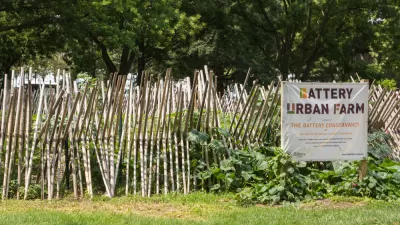Mayor Michael Bloomberg ramps up efforts to support NYC's growing urban food cluster via set up new legislation, signed yesterday.
A new piece by Dr. Michael Porter's (Harvard Business School) organization - the Initiative for a Competitive Inner City - analyzes how four of NYC's new pieces of legislation will support the growing urban food cluster, and why this is so important for our cities.
The author writes: "The food cluster truly provides massive potential for job creation and local wealth. The cluster is comprised of 90% small businesses and 1.1 million workers. Local food production creates jobs in warehousing, distribution and other supply chain management. Restaurants, markets and urban farms provide jobs for local residents-jobs that often require modest formal education. In an era where our inner city residents are evermore in need of such jobs, the food cluster provides boundless opportunities."
The article also profiles a Chicago-based company called UrbanPonics, which is a start-up urban food producer seeking to simultaneously promote social justice by hiring underserved local residents.
Thanks to Amanda Maher
FULL STORY: Only Local Lettuce for NYC Agencies, Please

Maui's Vacation Rental Debate Turns Ugly
Verbal attacks, misinformation campaigns and fistfights plague a high-stakes debate to convert thousands of vacation rentals into long-term housing.

Planetizen Federal Action Tracker
A weekly monitor of how Trump’s orders and actions are impacting planners and planning in America.

Chicago’s Ghost Rails
Just beneath the surface of the modern city lie the remnants of its expansive early 20th-century streetcar system.

Bend, Oregon Zoning Reforms Prioritize Small-Scale Housing
The city altered its zoning code to allow multi-family housing and eliminated parking mandates citywide.

Amtrak Cutting Jobs, Funding to High-Speed Rail
The agency plans to cut 10 percent of its workforce and has confirmed it will not fund new high-speed rail projects.

LA Denies Basic Services to Unhoused Residents
The city has repeatedly failed to respond to requests for trash pickup at encampment sites, and eliminated a program that provided mobile showers and toilets.
Urban Design for Planners 1: Software Tools
This six-course series explores essential urban design concepts using open source software and equips planners with the tools they need to participate fully in the urban design process.
Planning for Universal Design
Learn the tools for implementing Universal Design in planning regulations.
planning NEXT
Appalachian Highlands Housing Partners
Mpact (founded as Rail~Volution)
City of Camden Redevelopment Agency
City of Astoria
City of Portland
City of Laramie




























